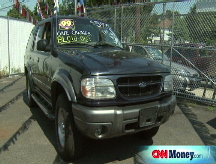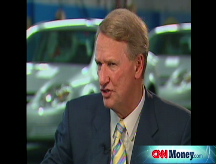Big Three bailout may be around corner
Automakers seek $50 billion in low-interest loans to convert plants from trucks to fuel efficient cars; presidential election could help their chances.
 |
| Detroit automakers are seeking $50 billion in government loans to speed the retooling of truck plants into assembly lines to make fuel efficient cars. |
NEW YORK (CNNMoney.com) -- Plunging auto sales, high gas prices and election year politics could help convince Congress to approve a $50 billion loan package to embattled U.S. automakers that Detroit's Big Three claim is key to their future success.
On Wednesday, General Motors (GM, Fortune 500), Ford Motor (F, Fortune 500) and Chrysler LLC reported monthly sales declines of at least 20% from a year ago, as American car buyers continued to turn away from SUVs and pickups and towards more fuel efficient car models.
The Big Three are now in the process of closing truck assembly lines and rushing to catch up with hybrid and other fuel efficient offerings from Toyota Motor (TM) and Honda Motor (HMC).
But with GM and Ford saddled with junk bond debt ratings and privately-held Chrysler with the thinnest capital cushion of the three, Detroit is caught in a credit squeeze that will make such investment difficult if not impossible.
"Funding such a shift is a tough lift even under optimum circumstances," said GM spokesman Greg Martin. "The credit markets are suffering. You had this seismic inversion of the market where no one wants to buy a full-size truck."
Thus, the automakers have deployed what one industry official describes as a "surge" of lobbyists and executives at both the Democratic and Republican Party's political conventions. The Big Three's hope is that if they can win speedy passage of the loan package, they can move more quickly to retool their plants to produce more smaller cars.
The $50 billion loan package, first proposed by the auto industry last month, has won the support of presidential candidates Barack Obama and John McCain as their campaigns eye key votes in Michigan and Ohio.
On Tuesday, White House Press Secretary Dana Perino signaled the outgoing Bush administration was open to approving the loans.
"It's something we're aware of and we're talking to the members of Congress and also the people in the industry, and thinking about what they might think would be required from their perspective," she said.
But as much support as the idea has, the automakers say they can't let up until the loan package is not only signed into law but also funded by Congress.
Last year's energy bill included up to $25 billion in loans to the Big Three, but lacked the necessary funding to actually make the money available.
That earlier legislation would allow automakers and suppliers to borrow the money at Treasury bill rates for up to 25 years as a way to fund the conversion of plants and the development of new technology. Because of their poor financial status, the automakers would be forced to borrow money at rates well above 10% in the open market.
The automakers have argued this is not a bailout and point out that the estimated cost of complying with new, tougher fuel efficiency standards for vehicles is just over $100 billion.
"Borrowing capital at a lower cost than the double-digit rates we're looking at will allow us to accelerate the technology, and transform the business quicker," said Ford spokesman Mike Moran.
Industry experts say that while the savings from the lower interest rates would amount to billions of dollars for the automakers, the program may not necessarily save a member of the Big Three from eventual bankruptcy in the way that federal loan guarantees rescued Chrysler in the 1970's.
"I'm not sure it's either essential for their survival or a guarantee of their turnaround," said Bob Schnorbus, chief economist with J.D. Power & Associates. "They're going to need a lot of liquidity over the next two years. Even $50 billion, with a lot of strings attached, isn't going to make or break them."
But David Cole, chairman of the Center for Automotive Research, said the loan package could be enough to keep some plants open that would otherwise be closed.
Cole added that the package is important to help keep GM, Ford and Chrysler competitive against their Asian rivals. So far this year, the Big Three have captured only 47% of U.S. auto sales, down from 51% in the same period last year.
"More than anything else, [the loan program] would ensure the viability of the companies over the longer-term," said Cole. "Right now they have to invest an enormous amount of cash in new technology at a time when their cash is low."
Under language of the bill, the loans would also be available to overseas automakers that have plants here, but industry officials say it's unlikely any would make use of the money. That's because foreign-based auto companies have strong enough balance sheets to finance the investment in new technology without the U.S. government's help.
Toyota spokeswoman Martha Voss said the company is neutral on the loan proposal at this time but that it will continue to monitor the discussions in Congress.
Cole argues the loan package could be a relatively cheap alternative to the economic harm that would take place if one of the automakers were to fall into bankruptcy. The estimated cost of the program is less than $8 billion, which factors in the risk of default on the loans.
"It's like with the Bear Stearns bailout," he said, referring to the investment bank that was sold to JPMorgan Chase with the help of the Federal Reserve earlier this year. "With so many jobs depending on each assembly line job, a failure could trigger a much more serious problem."
Cole and the automakers also think winning the support for the loans will be easier now that Congress has moved to help mortgage finance giants Fannie Mae (FNM, Fortune 500) and Freddie Mac (FRE, Fortune 500) as well as home owners who borrowed more than they could afford on their mortgages.
"This is a technology partnership, it's not a blank check like for Fannie and Freddie," said Linda Becker, a spokeswoman for Chrysler. "This is a critical time to improve the country's fuel economy."
But while Cole thinks there's a 75% chance the automakers will win what they're seeking, the automakers themselves say they have a relatively small window to get what they need. Congress is likely to be in session for about a month before the pre-election recess and winning approval in a new Congress could be difficult.
And even if a loan package is approved by Congress next year, the automakers say they need to get access to the cash sooner than later as auto sales continue to slide. So the Big Three is likely to put more pressure on Obama and McCain as well as members of Congress in the next few weeks.
"It's got the attention of both candidates and the battleground states are our states. It's where we do business," said Becker. "Every time they come through those states, they're going to hear from us and the employees and constituents." ![]()



